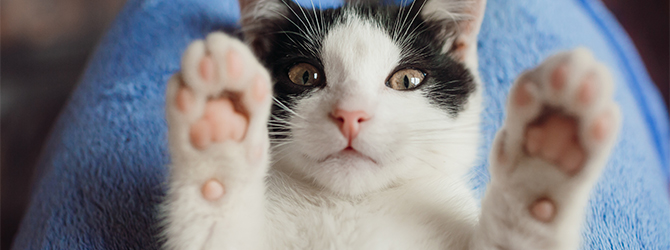Cat peeing outside their litterbox: why cats do it & how to prevent it
First Published: 20/12/2018
Last Updated: 25/01/2024
All cat owners know what it’s like – sipping bleary-eyed at their morning coffee and discovering that their furry friend has been peeing on the carpet again, or worse still, heading back to their room to get changed and finding out they’ve been peeing on the bed. You’re then worrying about how to get rid of cat pee smell from your house when you should be worrying about nicer things, like breakfast, or your exciting day ahead.
Let’s take a look at your cat’s possible reasons for peeing outside of their litterbox, and at the best methods of preventing it.
Why is my cat peeing on the floor, or outside of their litterbox?
Health or medical problems
Is your cat getting old? Is their peeing on your bed a recent development? If so, it could be that health problems (urinary tract infection, kidney disease or diabetes) are causing your cat to stop using their litterbox.
Famously, cats aren’t the best at telling us when they’re uncomfortable but if they’re unsettled or unwell, it can affect their behaviour in strange ways – peeing in the house and not in their litterbox, for example.
Inconvenient location of litterbox
If the litterbox is somewhere that is hard to access, your cat might simply be choosing to pee on the carpet instead. Likewise, if their litterbox is stored in a place your cat just doesn’t want to be in, they could have stopped using it for that reason.
Their litterbox is dirty and smelly
Put yourself in your cat’s shoes for a second… you have the choice between a smelly, unclean litterbox or a lovely, pristine human bed or carpet that you aren’t forced to sleep in… and you need the loo. Where would you choose?
They are stressed or anxious
Have you had lots of people over lately? Has there been a period of upheaval in your home, or is there a neighbour cat that won’t leave your garden?
Cats ‘spray’ urine as a way of marking their territory. They therefore feel safer when they can smell more of their own urine, so if your cat has suddenly started peeing on your bed or carpet, it could be because they’re trying to combat feelings of stress.
Another pet won’t let them
If you have two cats and one is constantly peeing on the carpet, it might be because the other cat never lets them get to the litterbox, or because they don’t feel safe using it.
You bought the wrong litter
Or it could, of course, simply be that the litter in the tray feels uncomfortable under your cat’s paws and they don’t like it. This is likely to be the case if your cat urinates right next to their litterbox, but not inside it.
How can I stop my cat from peeing on the carpet and get them peeing in their litterbox again?
Make sure that the litterbox is appealing to your cat. Store it somewhere close to social areas but not right in the middle. I.e., they have their privacy but don’t feeling smothered by people.
The litterbox should be kept clean at all times. Clean it out thoroughly and do so every day if you can. If you have two or more cats, it’s a good idea to have a separate litterbox for each pet, plus an additional one; if one cat is shyer than the others or if they’re often bullied, store their litterbox in an area that the other cats can’t access.
Studies have shown that kittens make up their minds about their preferred litter type at a very young age. Once you have established your cat’s favourite, try to stick to it as best you can. If there is any change in their environment, whether it’s the litter or other incidents occurring in the house, it’s important to realise that this is most likely the reason for your cat peeing outside their litterbox, and that they should revert to normal once the situation resolves itself.
If you have tried all of these, your house is as calm as a five-star island resort and your cat continues to pee everywhere but their litterbox, take them to the vet. They will be able to test for the health problems listed above and will also be able to advise if you need the help of a behaviourist.
Further advice?
If you need further advice, get in touch with your vet – they’ll always be happy to help.
Find your nearest vet using our Find a Vet page, or speak to a vet online using Online Vets.




